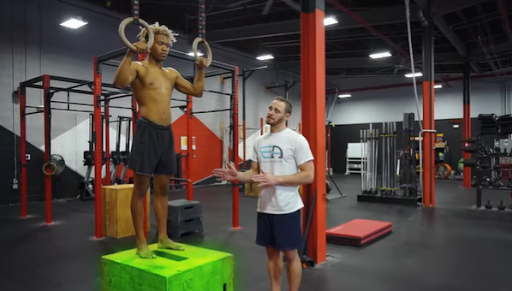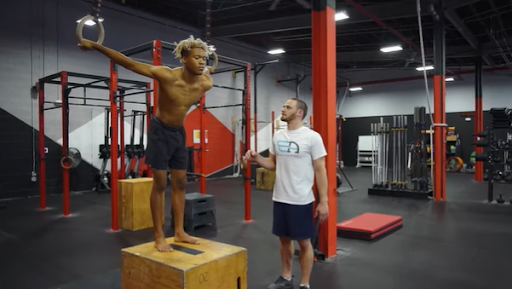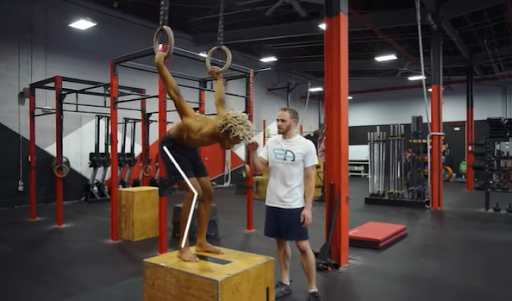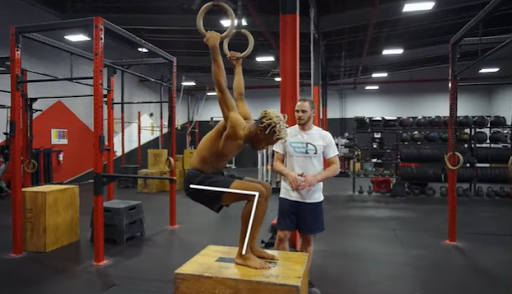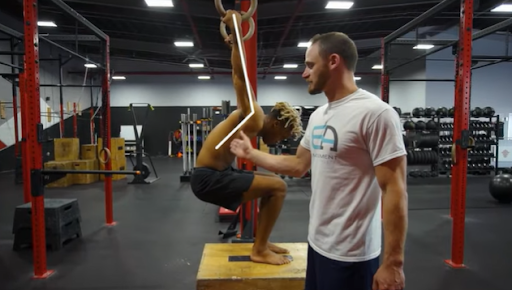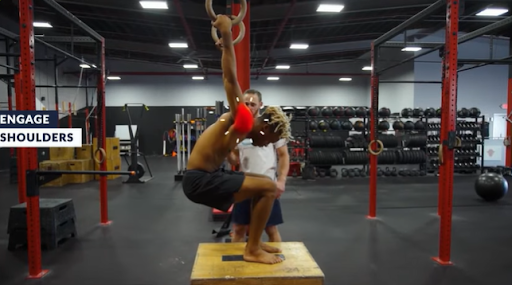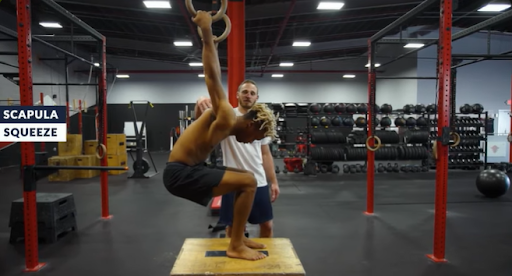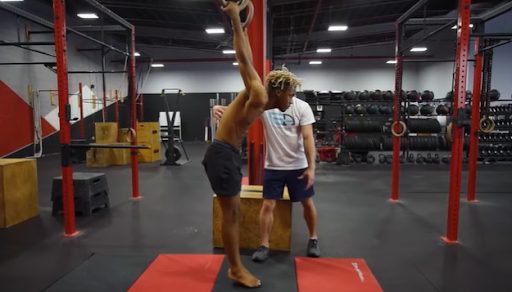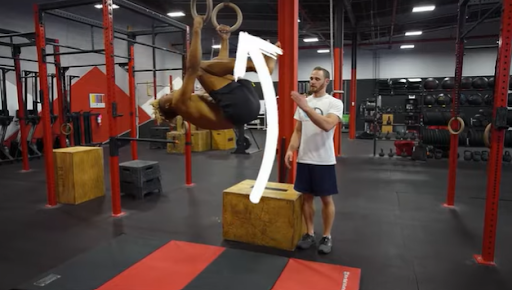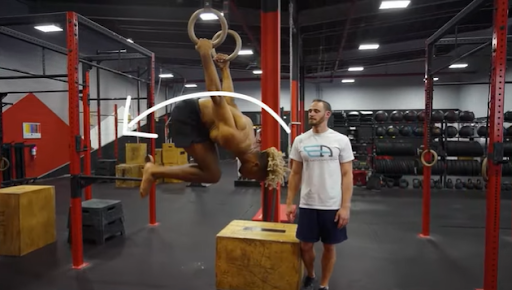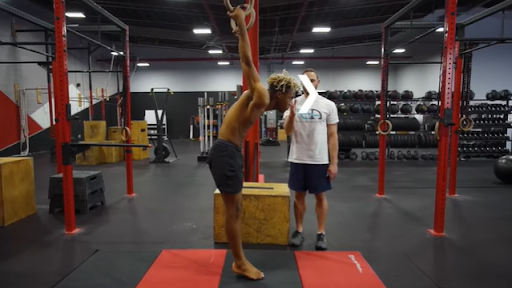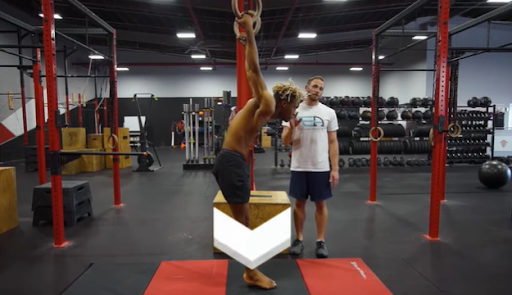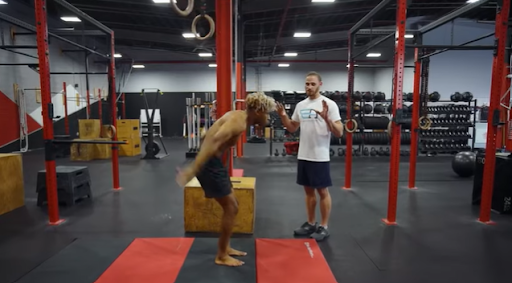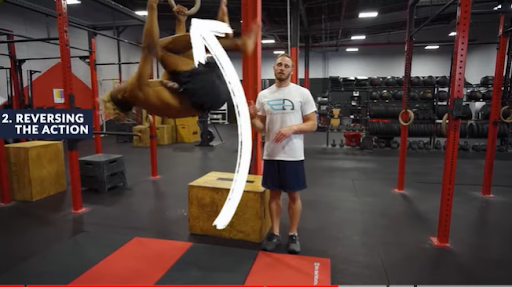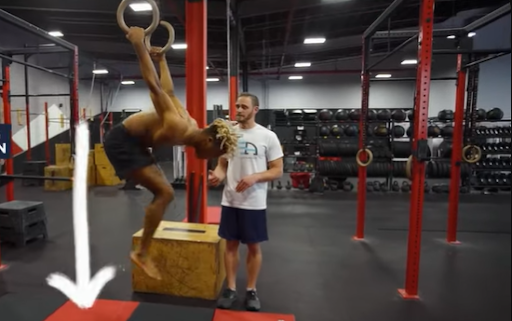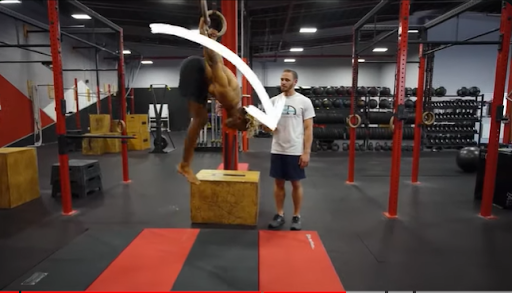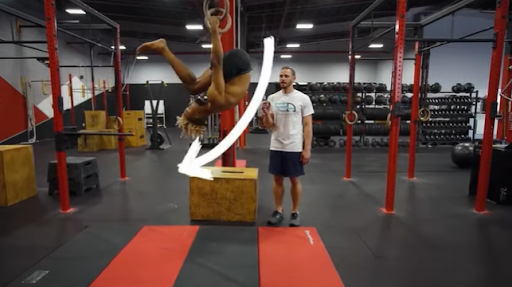Have you ever explored the depths of calisthenics and stumbled upon the enigmatic challenge of mastering the ‘Skin the Cat’ or ‘German Hang’?
It isn’t your run-of-the-mill routine; it’s a journey within itself and mastering it not only enhances flexibility but also strengthens the shoulders and core muscles. With each graceful movement, it demands attention to the smallest details, urging you to find the balance between power and finesse.
However, like any exercise, it requires proper execution to prevent injury 🤕 and maximize its benefits.
In this article, we’ll navigate its intricacies, uncover its secrets, and chart a course toward mastering this challenging yet immensely satisfying exercise. Let’s dive in!”
🎯 Understanding the Basics
The skin the cat maneuver involves hanging from a bar or rings, and circling the arms behind while gradually lowering into a stretch position.
It primarily targets the shoulders, back, and core muscles, requiring the engagement of the scapulae and controlled movements to execute the transition smoothly.
Mastery of the skin the cat exercise often serves as a stepping stone to more advanced calisthenics movements and helps enhance shoulder flexibility and strength.
😎 How to Do It: Technique and Progressions
The skin the cat or German hang is a challenging exercise that demands a blend of strength, flexibility, and control. Practicing with proper form and technique while focusing on gradual progression will help you master this movement effectively. Always prioritize safety and listen to your body to avoid potential injuries.
💥Easy Way: With Elevated Platform
Utilizing an elevated platform allows you to seamlessly transition into this movement from a standing position. This technique simplifies the process, making it easier for newcomers to grasp the initial steps. Let’s explore this introductory approach to entering the skin the cat position:
- Start from an Elevated Platform: Begin from a raised surface or an elevated platform, which makes it easier to get into the position without needing to hang or lift yourself.
- Stand and Circle Around the Arms: Stand near the edge of the elevated platform. Then, circle your arms behind you slowly. This movement helps in gradually getting into the stretching position.
- Gradually Increase the Stretch: As you circle your arms, start slowly bending your legs. The more you bend your legs, the more stretch you’ll feel in your shoulders and back, resembling the German hang or skin the cat position.
- Focus on the Stretch and Shoulder Engagement: Pay attention to the stretch you feel in your shoulders and back. Try to engage your shoulders a bit and squeeze the scapula together in your back. This engagement helps maintain stability and control.
- Maintain Breathing and Comfort: Ensure you can breathe comfortably in this position. It’s essential to maintain a steady breath while stretching. If it becomes too uncomfortable or difficult to breathe, ease out of the position slightly.
- Practice and Progress Gradually: This introductory method allows you to familiarize yourself with the movement. Practice regularly, gradually increasing the depth of the stretch as your flexibility and comfort improve.
Remember, the key is to start slowly, focus on the stretch and engagement of the shoulders, and ensure you can breathe comfortably in the position. Over time, as your body adapts, you can work towards a deeper skin the cat stretch.
💥Full Extension Variation
This method involves transitioning from a starting tuck position into a complete extension, emphasizing head positioning, hip openness, and controlled hanging. Let’s dive into the steps to achieve this challenging yet crucial position:
- Starting from a Tuck Position: Begin in a tuck position, similar to the earlier method. From here, the alternate way to enter the full extension variation is by circling in.
- Transition to Full Extension: Gradually circle in from the tuck position to reach full extension. At full extension, your head is facing forward, and your hips are mostly open and hanging.
- Hold the Position for 15 Seconds: Aim to maintain this full extension position for at least 15 seconds. It’s important to ensure you can comfortably breathe in this position while holding the stretch.
- Adjust Intensity if Necessary: If you find the position too intense or challenging, it’s advised to ease off a bit. It’s crucial to find a level that challenges you without causing excessive strain.
- Importance of Full Extension: This full extension position is significant as it often represents the endpoint of a back lever. Being comfortable in this position helps prevent potential shoulder injuries that might occur if transitioning too quickly or without control.
- Transition from Back Lever to Skin the Cat: When fatigued during a back lever, descending into the skin the cat position is a common way to come down safely. Mastering this transition is crucial to prevent sudden falls or shoulder injuries.
- Practice with Platform Assistance: Starting from a higher platform or elevated surface is a great way to practice this full extension variation. It provides better control and safety as you familiarize yourself with the movement.
Remember, gradually circling into the full extension position from the tuck, holding it comfortably for a set duration, and understanding its importance in the context of back levers are key aspects of mastering this variation. Practice safely and progressively to improve your skills and comfort level in this advanced position.
🙌 Way to Get Out From Skin the Cat
A controlled and calculated exit from the skin the cat position not only prevents injuries but also supports skill development, confidence, and overall training progress. It ensures a safer and more enjoyable experience while engaging in this challenging exercise. Here are the two ways to get out from skin the cat:
1. Let Go of the Rings
One way to exit the skin the cat position is by simply releasing the rings or bar. This method is particularly useful in emergency situations or if you need a quick dismount.
Ensure your feet are positioned underneath you, and then, when ready, let go of the rings. It’s essential to gauge your height—being lower makes this exit easier and reduces the impact of the fall.
2. Reversing the Action
This technique requires more strength but can be seen as a progression of movements for advanced athletes.
To execute this exit, tuck up and reverse the action you used to enter the position. By coming back out the same way you went in, you’re essentially reversing the motion.
This method is beneficial for those who already possess the necessary strength and control. It’s a challenging but effective exit strategy from the skin the cat position.
Here’s a YouTube video on how to do a skin the cat exercise: https://www.youtube.com/watch?v=W5SYUKmuHk4
💪🤕 Safety Considerations
While practicing the skin the cat, safety remains paramount. The exercise serves as a crucial endpoint for movements like the back lever.
Here are some crucial safety considerations:
- ☑️ Proper Warm-Up: Always start with a thorough warm-up that includes shoulder, back, and arm stretches. This exercise demands significant shoulder flexibility, so ensure your body is adequately prepared.
- ☑️ Progression: Gradually progress into the movement. Begin with easier variations or preparatory exercises to build strength and flexibility before attempting the full skin the cat. Work on exercises like hanging knee raises or tucked variations to prepare for the full movement.
- ☑️ Technique and Form: Focus on proper technique and form throughout the movement. Keep the shoulders engaged and depressed, and maintain control as you lower your body backward. Avoid jerky movements or swinging, which can strain the shoulders and back.
- ☑️ Equipment Safety: Ensure the equipment you’re using, such as a bar or rings, is secure and can support your weight. Check for any signs of wear or instability before starting the exercise.
- ☑️ Listen to Your Body: Pay attention to any discomfort or pain, especially in the shoulders or back. If you experience sharp pain or excessive discomfort, stop immediately and reassess your technique or seek guidance from a fitness professional.
- ☑️ Spotter or Assistance: Having a spotter or someone to assist you, especially when learning the movement initially, can provide safety and guidance.
- ☑️ Gradual Progression: Don’t rush the process. Progress gradually by increasing the range of motion or intensity over time. Rushing into advanced variations without proper preparation can lead to injury.
- ☑️ Rest and Recovery: Allow adequate rest between practice sessions to let your muscles recover. Overtraining can increase the risk of injury.
Remember, safety should always be a priority when attempting any new exercise or movement. If you’re unsure or new to this exercise, consider seeking guidance from a fitness professional or trainer to ensure proper form and technique.
Benefits of Skin the Cat
Exploring the skin the cat exercise reveals a versatile and impactful addition to any fitness regimen. This advanced bodyweight movement involves controlled hanging and rotational movements, offering a myriad of benefits that contribute to improved flexibility, strength, and overall upper-body functionality.
Here are some benefits you can expect from this exercise:
- 🏆 Shoulder Mobility and Flexibility: It significantly improves shoulder mobility and flexibility by stretching the shoulders, chest, and upper back. This exercise involves a deep shoulder extension, promoting a wider range of motion.
- 🏆 Strengthens Upper Body Muscles: It engages various upper body muscles, including the shoulders, back, arms, and core. The exercise strengthens these muscles, enhancing overall upper body strength and stability.
- 🏆 Enhances Grip Strength: Holding onto the bar or rings in the skin the cat position challenges and improves grip strength, which is beneficial for various activities and exercises.
- 🏆 Core Activation: Maintaining the tucked position or controlled movement engages the core muscles, aiding in core strength and stability.
- 🏆 Preparation for Advanced Moves: It serves as a foundational movement for more advanced gymnastic and calisthenics exercises, such as back levers and muscle-ups. Mastering the skin the cat builds the necessary strength and mobility for these advanced maneuvers.
- 🏆 Body Awareness and Control: Performing the skin the cat requires control, coordination, and body awareness. Practicing this exercise enhances proprioception and overall body control.
- 🏆 Functional Fitness: The movement mimics real-life scenarios involving hanging, pulling, and upper body strength, contributing to functional fitness and everyday strength.
🧐Frequently Asked Questions
🔎 What muscles does the ‘Skin the Cat’ exercise work?
The ‘Skin the Cat’ primarily targets the shoulders, back, and core muscles. It engages the latissimus dorsi, deltoids, trapezius, abdominals, and various stabilizing muscles throughout the upper body.
🔎 Is the ‘Skin the Cat’ suitable for beginners?
While it’s an intermediate-level exercise, beginners can work toward it by starting with preparatory exercises that build shoulder and core strength. Progress gradually and with proper guidance.
🔎 How do I progress to performing a ‘Skin the Cat’ if I’m a beginner?
Begin with easier progressions, like hanging knee raises or tucked variations, to strengthen the necessary muscles and improve shoulder flexibility. As you gain strength and confidence, gradually extend the range of motion.
🔎 Can ‘Skin the Cat’ cause shoulder pain or injury?
When done with proper form and gradual progression, the ‘Skin the Cat’ shouldn’t cause injury. However, poor technique, rushing progression, or inadequate warm-up can lead to shoulder discomfort or injury. Listening to your body and practicing proper form is crucial.
🔎 How should I warm up before attempting ‘Skin the Cat’?
Warm up by performing shoulder, back, and arm stretches. Incorporate dynamic movements that prepare the shoulders for the range of motion required in the exercise.
🔎 How many repetitions or sets should I do when practicing ‘Skin the Cat’?
Start with a few repetitions (3-5) or hold at a comfortable level. Focus on quality over quantity, ensuring proper form throughout the movement. Gradually increase repetitions or hold times as strength and comfort with the exercise improve.
🔎 Should I use rings or a bar for skin the cat?
Both rings and a bar can be used for skin the cat. Rings might offer more freedom of movement and require additional stabilization, while a bar provides stability. Choose based on personal preference and comfort.
🔎 Can skin the cat help with improving flexibility?
Yes, skin the cat is an excellent exercise for enhancing shoulder flexibility. Consistent practice can gradually improve shoulder mobility and flexibility.
🔎 What if I can’t complete the full range of motion for skin the cat?
Work within your comfortable range of motion and gradually progress. If you can’t complete the full movement yet, focus on preparatory exercises and steadily increase the range as your strength and flexibility improve.
✨Conclusion
Mastering the skin the cat exercise involves a blend of technique, controlled movements, and a keen awareness of safety measures. Progressing through various stages, understanding the body’s response, and using proper dismount techniques are pivotal in reaping the benefits while minimizing the risk of injury.
With a focus on technique, gradual progression, and safety, anyone aiming to navigate the intricacies of ‘Skin the Cat’ can embark on a rewarding journey of calisthenics mastery.
Take the first step towards your fitness goals by accessing the assessment through The Movement Athlete.
The Movement Athlete offers a comprehensive range of resources, including personalized workout plans, expert guidance on calisthenics, and a supportive community to help you achieve and surpass your fitness aspirations.

